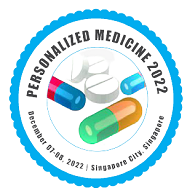Call for Abstract
Scientific Program
14th World Congress on Personalized Medicine and Novel Therapy, will be organized around the theme “Exploring Innovations in advancing Personalized Medicine and Bio-Markers”
Personalized Medicine 2022 is comprised of keynote and speakers sessions on latest cutting edge research designed to offer comprehensive global discussions that address current issues in Personalized Medicine 2022
Submit your abstract to any of the mentioned tracks.
Register now for the conference by choosing an appropriate package suitable to you.
Personalized medicine, precision medicine, or theranostics is a medical model that separates people into different groups with medical decisions, practices, interventions and/or products being tailored to the individual patient based on their predicted response or risk of disease. The terms personalized medicine, precision medicine, stratified medicine and P4 medicine are used interchangeably to describe this concept[1][2] though some authors and organisations use these expressions separately to indicate particular nuances.
Research on cardiovascular genetics has had some spectacular successes in uncovering new therapeutic targets—for example, the finding that people with inactivating mutations in the gene encoding the trafficking protein PCSK9 are at a much lower risk for heart attacks led to the development of antibody therapy targeting this protein. However, when it comes to personalizing treatment for cardiovascular disease on the basis of an individual patient's genetic makeup or biomarker data, there are currently only a handful of options where such an approach has proven to be clinically useful.
There are currently three major approaches to T cell-based cancer immunotherapy, namely, active vaccination, adoptive cell transfer therapy and immune checkpoint blockade. Recently, this latter approach has demonstrated remarkable clinical benefits, putting cancer immunotherapy under the spotlight. Better understanding of the dynamics of anti-tumour immune responses (the "Cancer-Immunity Cycle") is crucial for the further development of this form of treatment.
Advances in human genome research are opening the door to a new paradigm for practising medicine that promises to transform healthcare. Personalized medicine, the use of marker-assisted diagnosis and targeted therapies derived from an individual's molecular profile, will impact the way drugs are developed and medicine is practiced.
This perspective addresses conceptual approaches that can be undertaken to develop and apply clinical decision support in electronic health record systems to achieve personalized medical care. In addition, to represent meaningful benefits to personalized decision-making, a comparison of current and future applications of clinical decision support to enable individualized medical treatment plans is presented.
The development of cost-effective technologies able to comprehensively assess DNA, RNA, protein, and metabolites in patient tumours has fuelled efforts to tailor medical care. Indeed validated molecular tests assessing tumour tissue or patient germ line DNA already drive therapeutic decision making. However, many theoretical and regulatory challenges must still be overcome before fully realizing the promise of personalized molecular medicine.
The vision of personalized medicine, the practice of medicine where each patient receives the most appropriate medical treatments and the most fitting dosage and combination of drugs based on his or her genetic make-up, seems to become more realistic as our knowledge about the human genome rapidly expands. We already know the reason for many types of adverse drug reactions, which are often related to polymorphic gene alleles of drug metabolizing enzymes.
The ability of biomarkers to improve treatment and reduce healthcare costs is potentially greater than in any other area of current medical research. For example, the American Society of Clinical Oncology estimates that routinely testing people with colon cancer for mutations in the K-RAS oncogene would save at least US $600 million a years.

